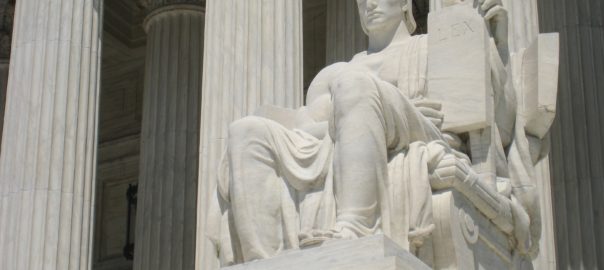Guest Blogger Bio:
Hi! I’m Mark Gutman and I’m excited to be this week’s guest blogger. I am a former criminal defense attorney and current education law attorney representing students in disciplinary hearings across New York City and the surrounding counties. Student disciplinary cases are on the border of education law and criminal defense, where students are accused of misconduct and need to prove that either (1) the conduct they’re accused of never happened, (2) they have a defense to the misconduct, or (3) the school is using evidence that is inadmissible. For today’s case, we’ll discuss one way in which evidence used against a student in a suspension case may be inadmissible.
For more information about student rights, you can contact me or my partner, Anthoula Vasiliou, directly over at www.GVLLP.com.
—
N.J. v. T.L.O.
469 U.S. 325 (1985)
Issue:
Does a student have a Fourth Amendment right to be safe from unreasonable searches and seizures when they are in a school setting?
Holding:
The Supreme Court of the United States held that yes, students do have a right to be safe from unreasonable searches and seizures even when they are within the confines of the school building. However, like other fundamental rights, those rights are slightly diminished for students. A student can be searched if school officials have reasonable suspicion, not just probable cause.
Facts:
A high school teacher caught a 14-year-old girl, T.L.O., in the bathroom with cigarette smoke in the air. She was brought to the principal’s office where she vehemently denied that she had been smoking and stated that she never smoked. The principal grabbed her purse and searched through it. He found not only a pack of cigarettes, but also marijuana, a pipe, plastic bags, a substantial amount of money, and an index card with the names of students who owed T.L.O. money, presumably for the sale of marijuana.
T.L.O. was suspended but also, the search was used against her in juvenile court where she was adjudicated as a delinquent. She appealed her case and argued to the court that the school did not have the right to grab her purse and search through it because it violated her Fourth Amendment right to be protected against unreasonable searches and seizures. The New Jersey Supreme Court agreed with her, reversed the decision of the lower court, and found that T.L.O.’s rights had been violated. The Supreme Court of the United States, however, felt differently.
Analysis:
The Supreme Court of the United States agreed with T.L.O. on one thing – students do maintain their right to be safe from unreasonable searches and seizures, even in a school. However, the Court found that what is considered unreasonable is different for a student in school than it would be for an adult in other settings. The Supreme Court balanced the child’s interest in privacy against “the substantial interest of teachers and administrators in maintaining disciple in in the classroom and on school grounds.” The Court found that in doing so, the proper standard is “reasonable suspicion.”
“This standard will, we trust, neither unduly burden the efforts of school authorities to maintain order in their schools nor authorize unrestrained intrusions upon the privacy of schoolchildren. By focusing attention on the question of reasonableness, the standard will spare teachers and school administrators the necessity of schooling themselves in the niceties of probable cause and permit them to regulate their conduct according to the dictates of reason and common sense. At the same time, the reasonableness standard should ensure that the interests of students will be invaded no more than is necessary to achieve the legitimate end of preserving order in the schools.”
When the Court applied this new standard to the facts in this case, it determined that yes, there was reasonable suspicion to search T.L.O.’s purse. Because T.L.O. was accused of smoking, a search of her purse would reveal whether she was actually in possession of cigarettes or not. The Court found that this was enough of a link to be reasonable and made the search of the purse legal. Once the search of the purse was justified, anything that the principal found during that search was fair game. Therefore, the evidence found could be used against her both in her suspension as well as the juvenile court hearing.
